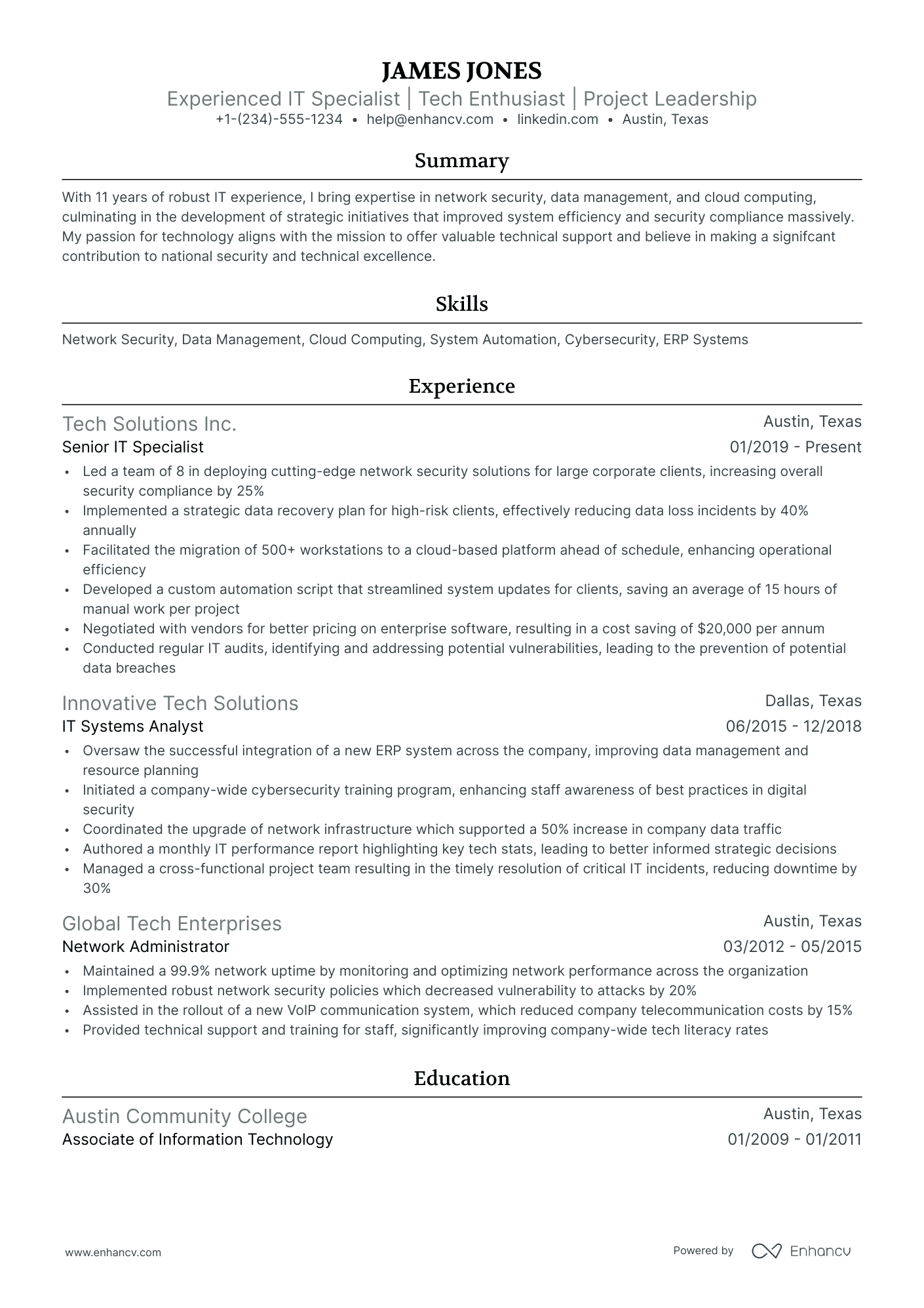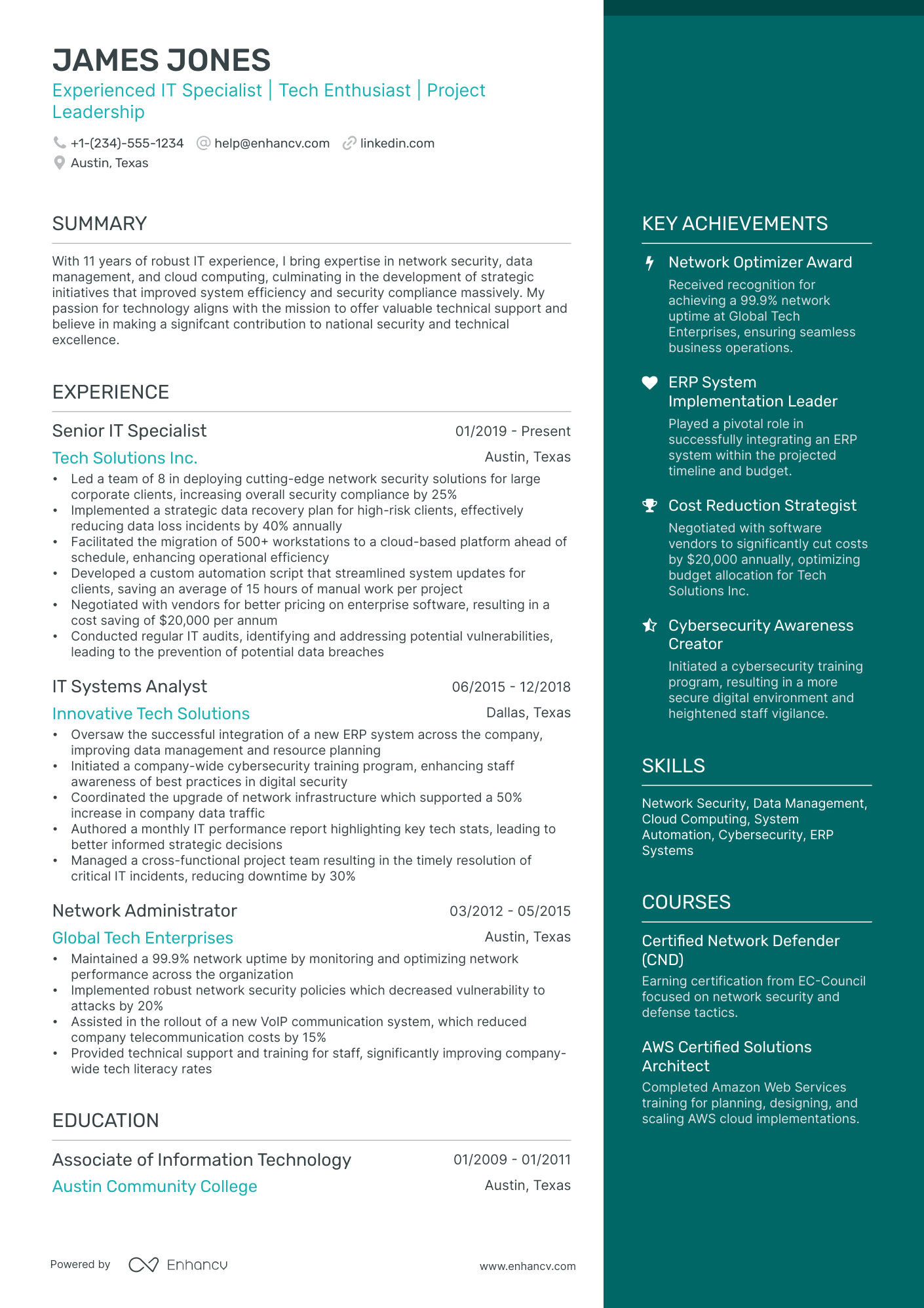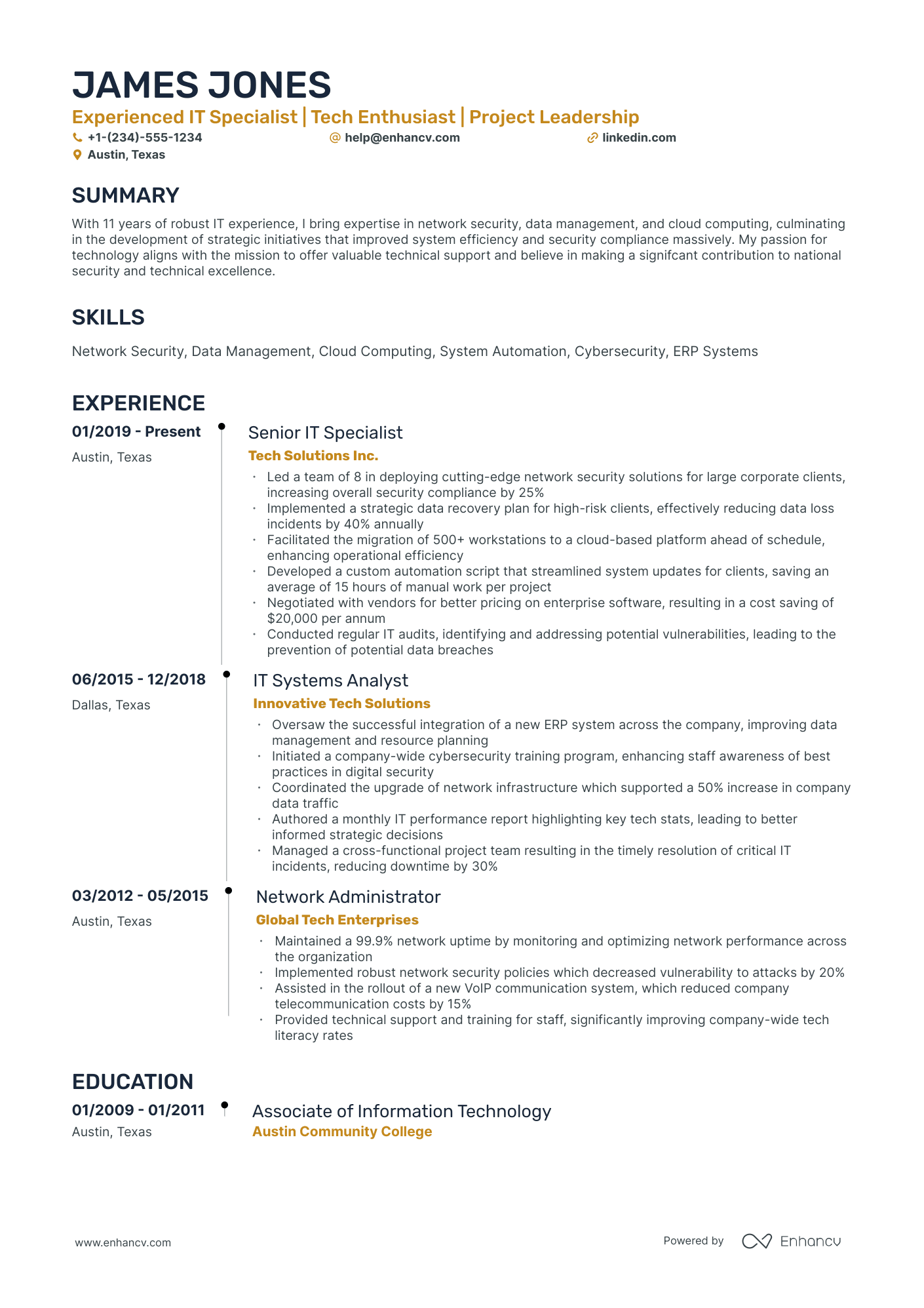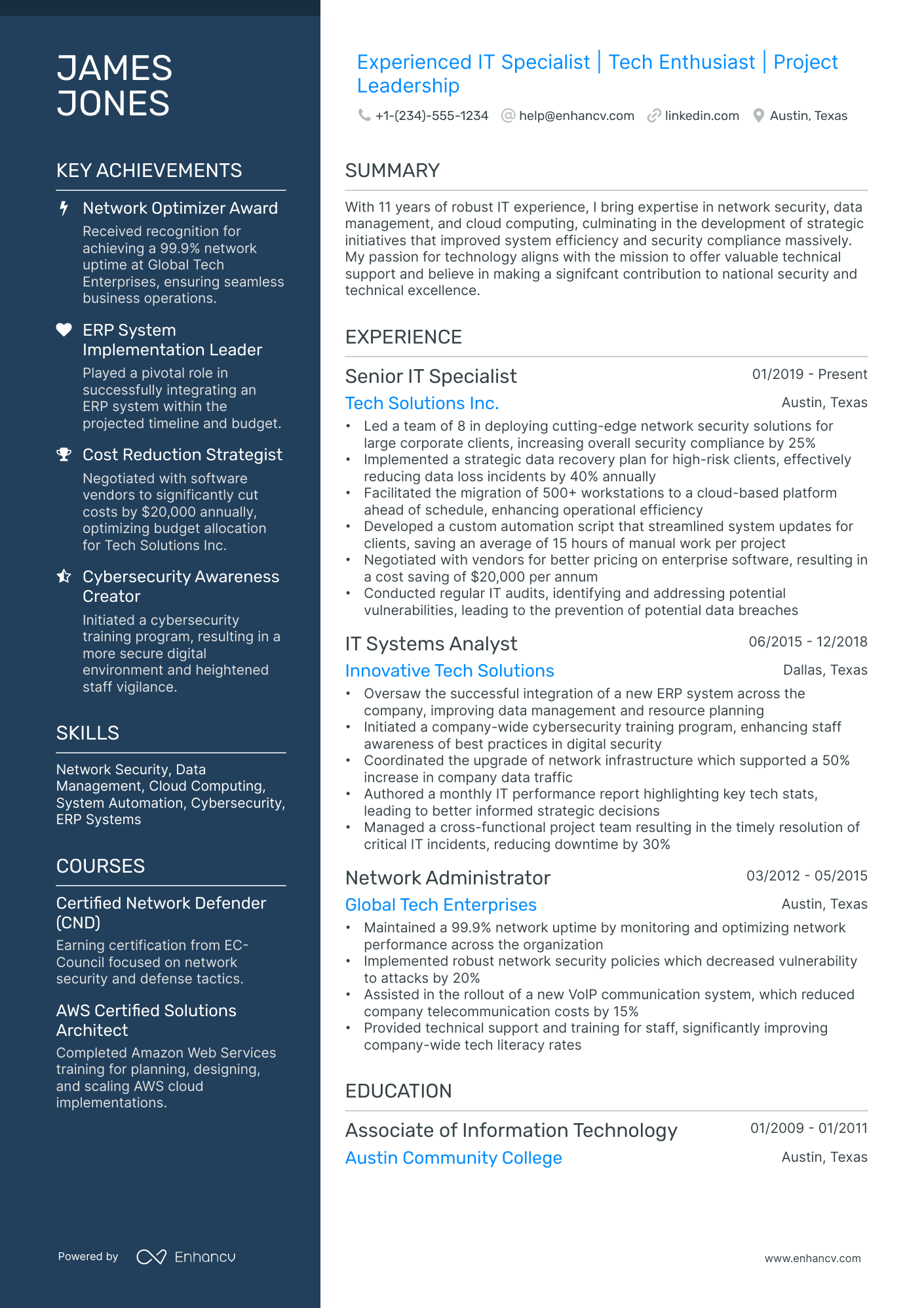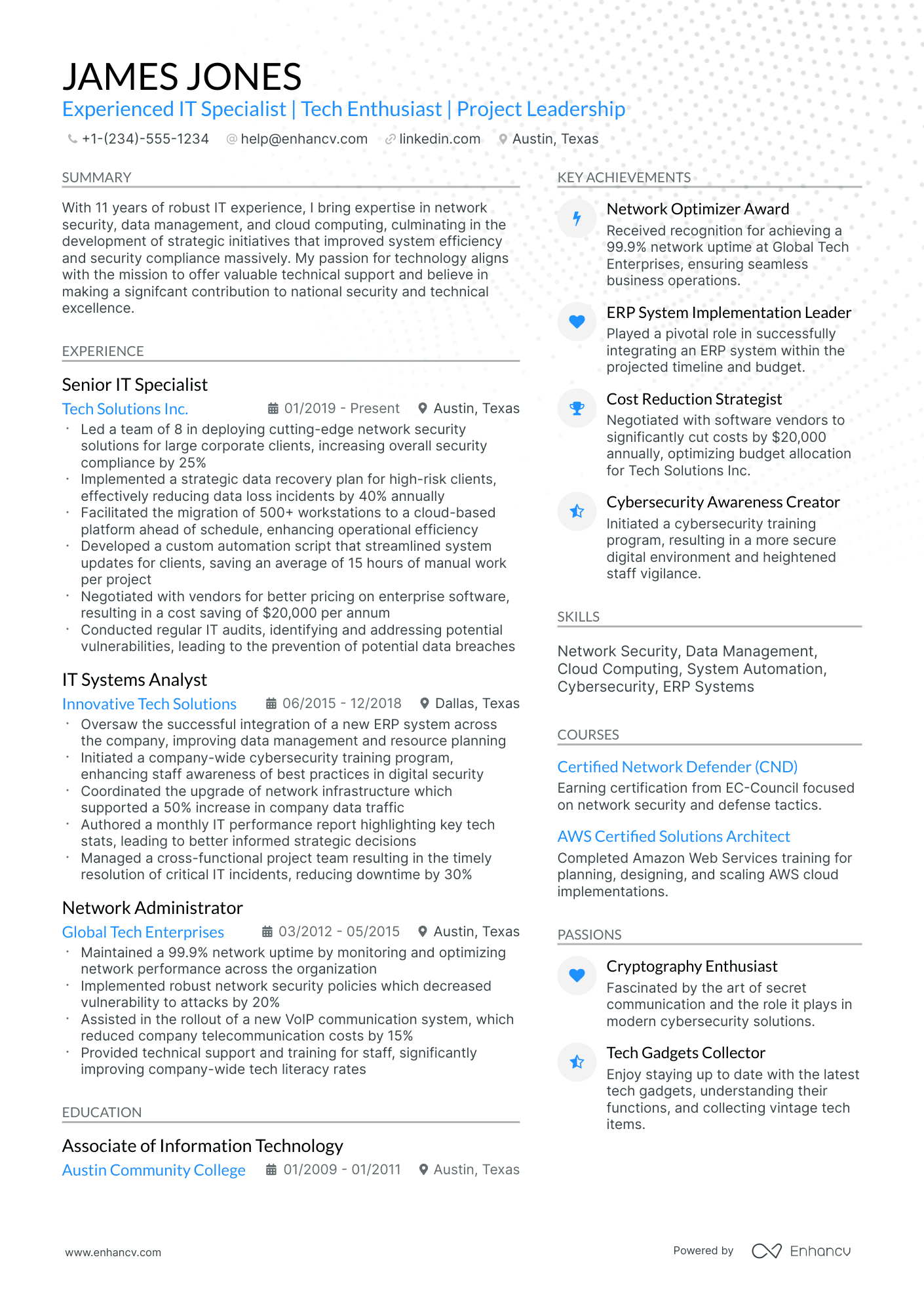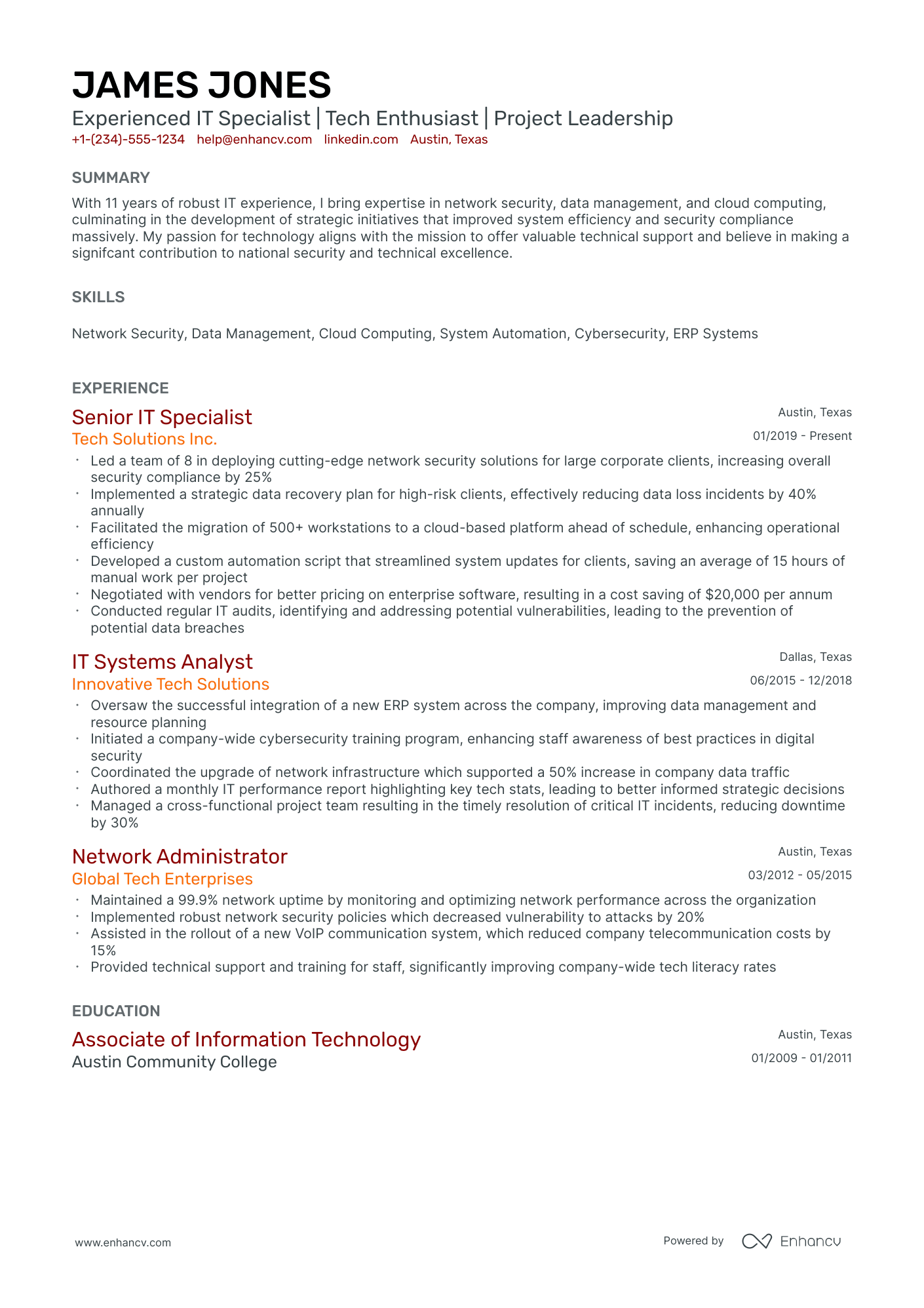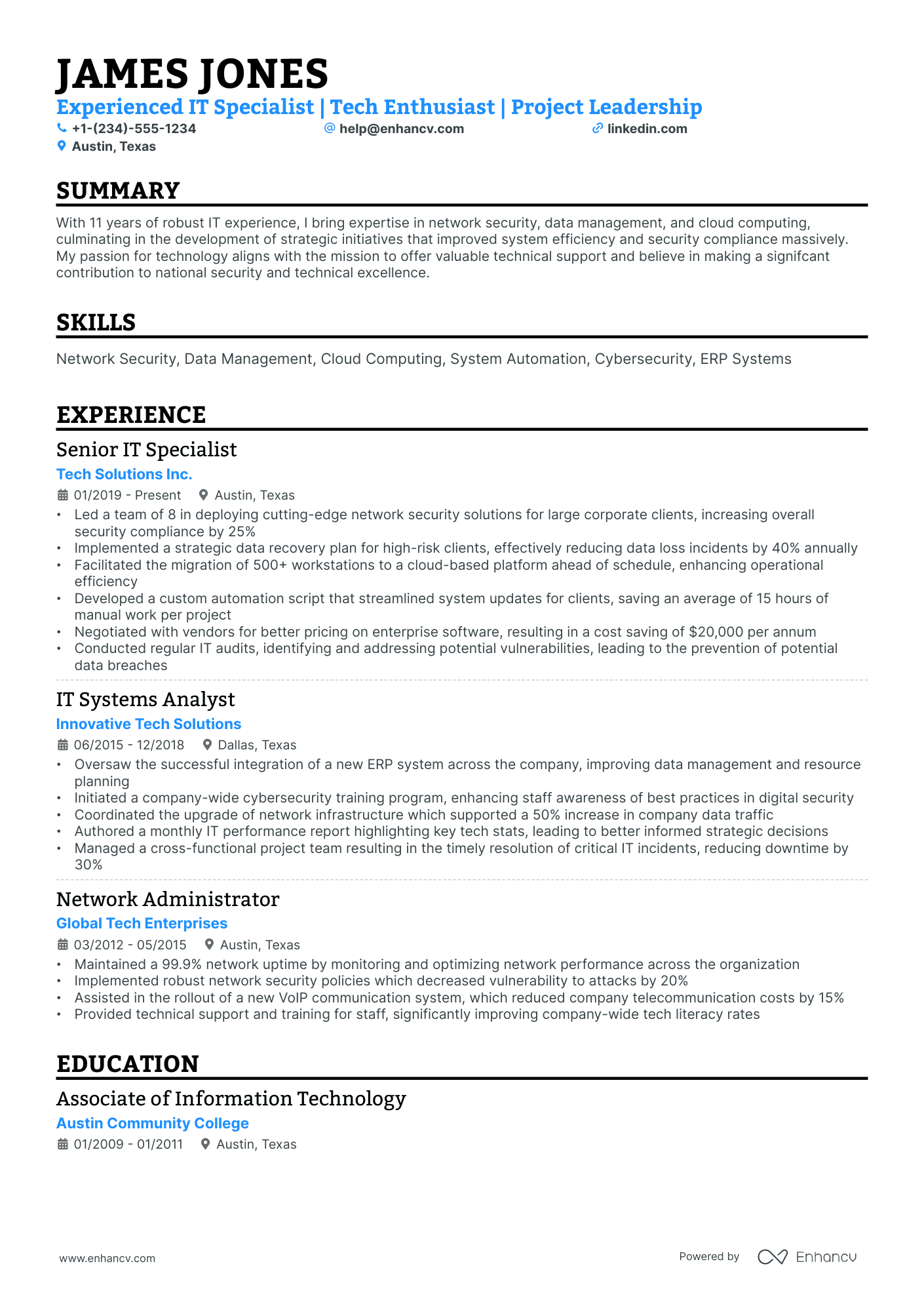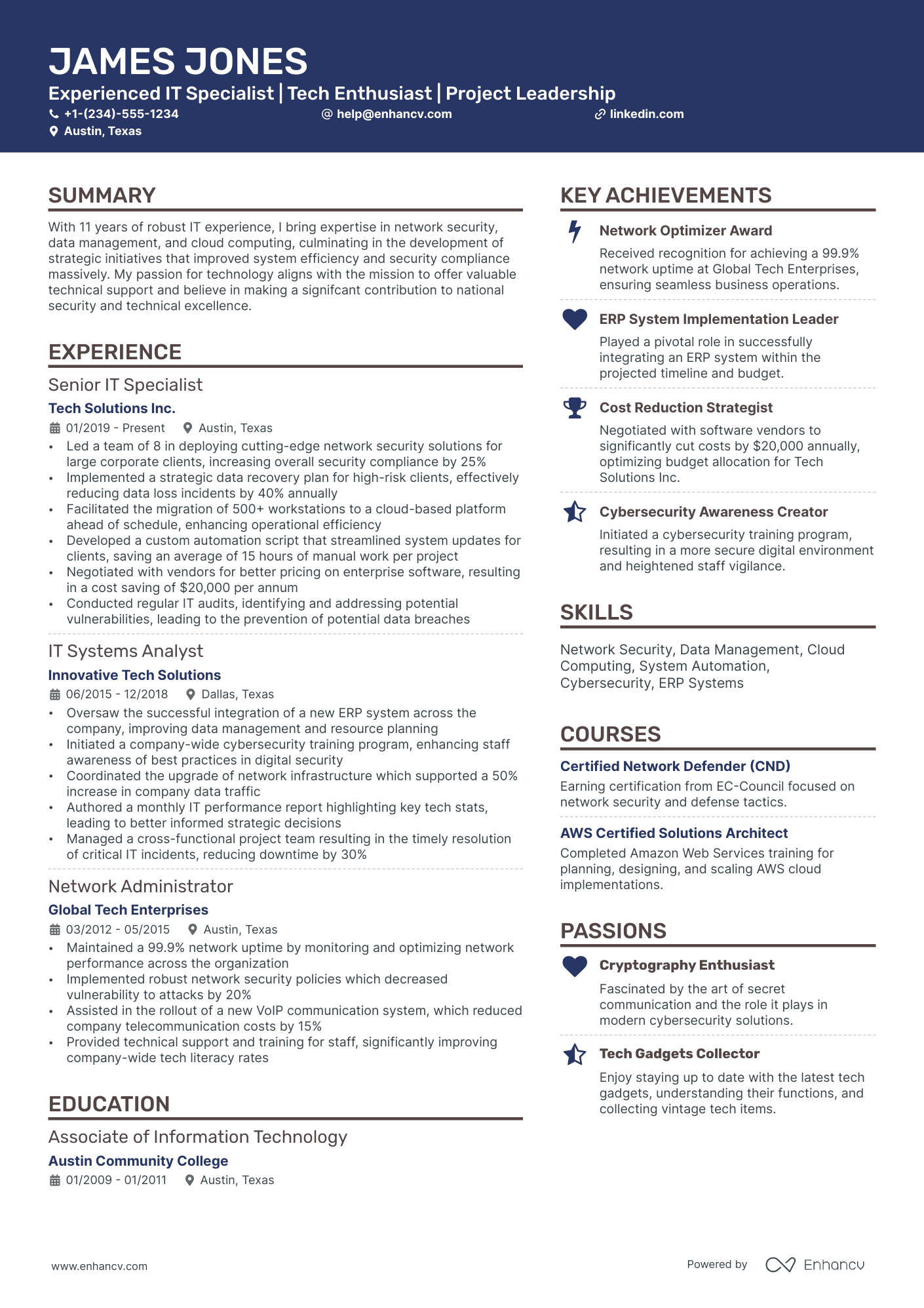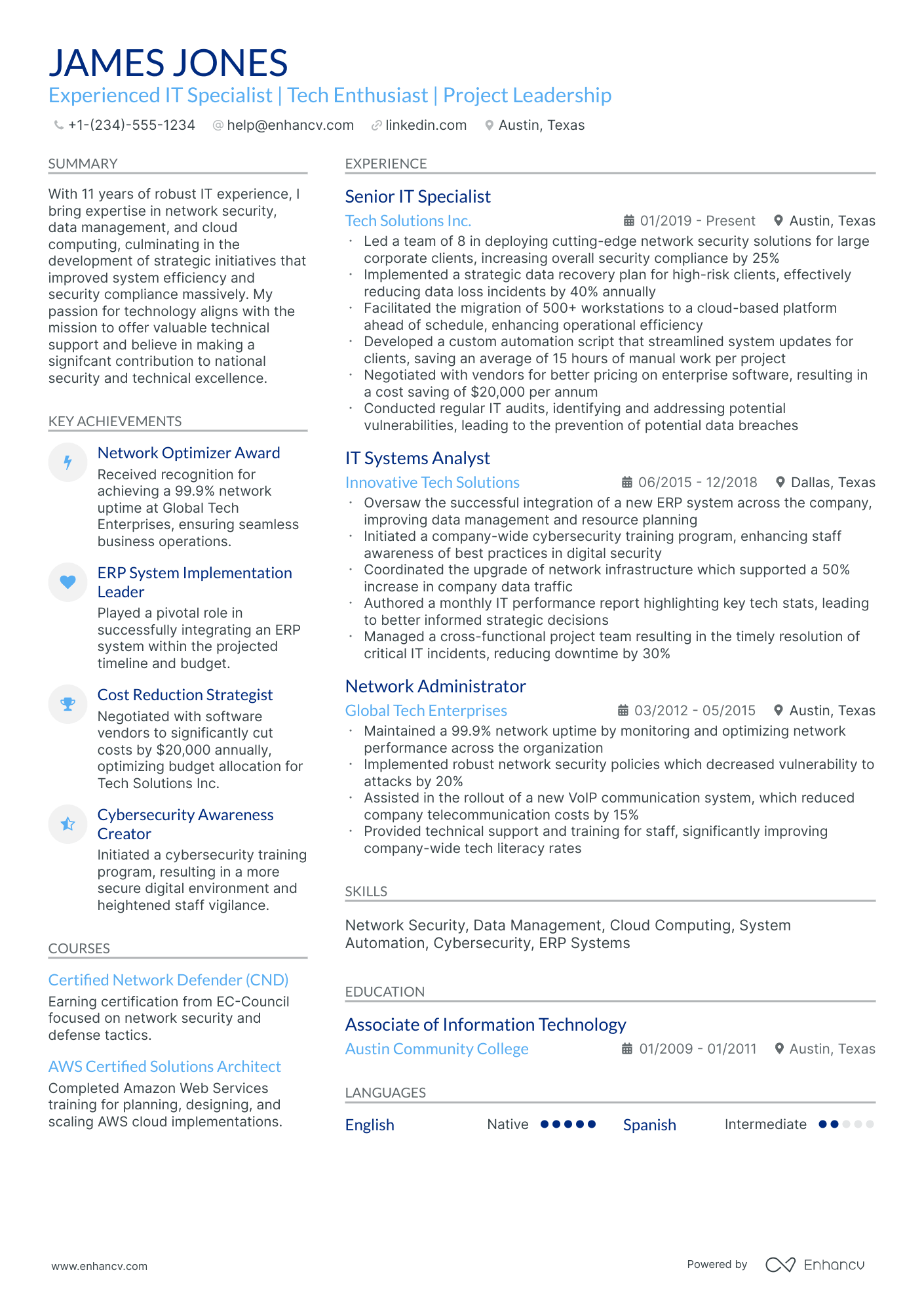One challenge you may encounter as a military veteran is effectively translating your military experience into civilian terms that resonate with potential employers. Our comprehensive guide can provide you with tailored strategies and examples to bridge this gap, aligning your unique skills with the needs of the civilian job market.
- Get inspired from our military resume samples with industry-leading skills, certifications, and more.
- Show how you can impact the organization with your resume summary and experience.
- Introducing your unique military expertise with a focus on tangible results and achievements.
If the military resume isn't the right one for you, take a look at other related guides we have:
Enhancing your military resume: format and layout tips
"Less is more" - this principle is key for your military resume design. It emphasizes the importance of focusing on why you're the ideal candidate. Simultaneously, it's crucial to select a resume design that is both clear and simple, ensuring your qualifications are easily readable.
Four popular formatting rules (and an additional tip) are here to optimize your military resume:
- Listing experience in reverse chronological order - start with your most recent job experiences. This layout helps recruiters see your career progression and emphasizes your most relevant roles.
- Including contact details in the header - make sure your contact information is easily accessible at the top of your resume. In the header, you might also include a professional photo.
- Aligning your expertise with the job requirements - this involves adding essential sections such as experience, skills, and education that match the job you're applying for.
- Curating your expertise on a single page - if your experience spans over a decade, a two-page resume is also acceptable.
Bonus tip: Ensure your military resume is in PDF format when submitting. This format maintains the integrity of images, icons, and layout, making your resume easier to share.
Finally, concerning your resume format and the Applicant Tracker System (ATS):
- Use simple yet modern fonts like Rubik, Lato, Montserrat, etc.
- All serif and sans-serif fonts are friendly to ATS systems. Avoid script fonts that look like handwriting, however.
- Fonts such as Ariel and Times New Roman are suitable, though commonly used.
- Both single and double-column resumes can perform well with the ATS.
The layout of a resume can differ by region – Canadian resumes may use a distinct format.
Upload & Check Your Resume
Drop your resume here or choose a file. PDF & DOCX only. Max 2MB file size.
PRO TIP
Always remember that your military certifications can be quantified across different resume sections, like your experience, summary, or objective. For example, you could include concise details within the expertise bullets of how the specific certificate has improved your on-the-job performance.
Traditional sections, appreciated by recruiters, for your military resume:
- Clear and concise header with relevant links and contact details
- Summary or objective with precise snapshot of our career highlights and why you're a suitable candidate for the military role
- Experience that goes into the nuts and bolts of your professional qualifications and success
- Skills section(-s) for more in-depth talent-alignment between job keywords and your own profile
- Education and certifications sections to further show your commitment for growth in the specific niche
What recruiters want to see on your resume:
- Proven leadership experience and ability to lead teams in high-pressure situations
- Demonstrated excellence in tactical planning, strategy development, and mission execution
- Expertise in handling sensitive information with the utmost discretion and adherence to security protocols
- Strong understanding of military protocols, chain of command, and experience working within a military structure
- Physical fitness and the capacity to meet the rigorous demands of military operations
Essential tips for crafting your military resume experience section
The experience section is indeed the core of your military resume. It's where you present your past and current job roles. But how should you approach this crucial part?
A common error is treating the experience section as merely a list of job duties. Many candidates fall into the trap of detailing what they did without illustrating the impact of their actions.
To effectively write your military resume experience section, consider these guidelines:
- Emphasize your achievements, supported by concrete metrics such as percentages, revenue increases, or customer satisfaction rates;
- Avoid using generic buzzwords like communication, hard work, or leadership. Instead, demonstrate how these skills added value in your previous roles;
- Begin each bullet point with a strong action verb, followed by a skill, and then the result of your actions;
- Tailor your resume for each job application by selecting the most relevant experiences, responsibilities, and successes.
We have an array of resume examples that illustrate how to optimally curate your military resume experience section.
- Directed a team of 12 in executing strategic patrol operations resulting in a 30% reduction in security incidents within our area of responsibility.
- Implemented an advanced technology update for communication systems, resulting in enhanced coordination and a 40% decrease in equipment failure rate.
- Designed and supervised rigorous training programs for new recruits, improving overall unit readiness and performance metrics by 25%.
- Conducted over 150 reconnaissance and surveillance missions, providing critical intelligence that informed the strategic decisions of high-level commanders.
- Oversaw the integration of unmanned aerial systems into the unit’s operations, which improved the surveillance coverage by 50% and reduced risk to personnel.
- Managed a budget of $2 million for equipment procurement and maintenance, ensuring optimal resource allocation and zero over-expenditure.
- Led an armored vehicle crew through 100+ successful missions with a keen focus on safety procedures and threat assessment, minimizing risks during high-tension scenarios.
- Mentored and evaluated 20+ personnel, developing goal-oriented training plans that enhanced their tactical skills and operational performance.
- Organized cross-functional training with allied military units, which resulted in improved collaboration and mission success rates for multinational operations.
- Efficiently processed and analyzed over 500 intelligence reports, creating actionable strategies that preemptively neutralized threats and safeguarded troops.
- Developed a comprehensive intelligence-sharing network with regional partners that bolstered collective security efforts and reduced intelligence gaps by 40%.
- Spearheaded the modernization of the unit's intelligence database systems, which shortened report processing time by 20% and improved data reliability.
- Orchestrated the logistics for deploying 400 personnel and equipment to overseas locations, ensuring 100% accountability and zero loss of assets.
- Served as a primary advisor for sustainment operations, optimizing supply chain management and reducing logistical costs by 15% without compromising operational readiness.
- Coordinated with multiple service branches to support joint exercises, achieving seamless integration of logistical support across diverse military units.
- Piloted multiple aircraft models in a variety of weather conditions, accumulating over 1000 flight hours and maintaining an impeccable safety record.
- Developed and executed air support plans that provided critical cover for ground operations, enhancing the offensive capabilities of the unit in hostile environments.
- Trained 30+ new pilots, emphasizing aerial combat techniques and effective mission planning, which resulted in these pilots exceeding the squadron's average readiness scores.
- Deployed as part of an elite Special Operations unit, contributing to high-risk missions that disrupted enemy supply chains and reduced hostile activities by 60%.
- Initiated a comprehensive cyber-security protocol for the unit, vastly improving the security of communication channels and sensitive data.
- Led a joint humanitarian operation that provided medical and disaster relief assistance to over 10,000 affected civilians, earning a commendation for outstanding service and leadership.
- Supervised the operation and maintenance of complex radar and electronic warfare systems, ensuring peak performance during critical surveillance operations.
- Led an initiative to train personnel in advanced signal processing techniques, which improved detection capabilities and reduced false alarm rates by 20%.
- Collaborated with engineering teams to upgrade electronic defense infrastructure, greatly enhancing the operational lifespan and effectiveness of the systems.
Quantifying impact on your resume
- Quantify your leadership experience by stating the number of personnel you've managed or trained.
- Highlight the size of the budget you were responsible for to demonstrate financial acumen.
- Mention the number of missions or operations you've planned and executed to indicate organizational skills.
- Specify the percentage of efficiency improvement or cost reduction you achieved in your role.
- Detail the number of countries or regions you operated in to show your adaptability.
- Include the quantities of equipment or assets you were accountable for to showcase responsibility.
- State the number of reports or briefings you've produced to underline your communication skills.
- List the measurable improvements in performance indicators under your command or guidance.
Action verbs for your military resume
No relevant experience - what to feature instead
Suppose you're new to the job market or considering a switch in industry or niche. In such cases, it's common to have limited standard professional experience. However, this isn't a cause for concern. You can still craft an impressive military resume by emphasizing other sections, showing why you're a great fit for the role:
- Emphasize your educational background and extracurricular activities to demonstrate your industry knowledge;
- Replace the typical experience section with internships or temporary jobs where you've gained relevant skills and expertise;
- Highlight your unique skill set, encompassing both technological and personal abilities;
- Showcase transferable skills acquired throughout your life and work experiences so far.
Recommended reads:
PRO TIP
If you failed to obtain one of the certificates, as listed in the requirements, but decide to include it on your resume, make sure to include a note somewhere that you have the "relevant training, but are planning to re-take the exams". Support this statement with the actual date you're planning to be re-examined. Always be honest on your resume.
Featuring your hard skills and soft skills on your military resume
The skills section of your military resume needs to your various capabilities that align with the job requirements. List hard skills (or technical skills) to showcase to potential employers that you're perfectly apt at dealing with technological innovations and niche software. Meanwhile, your soft skills need to detail how you'd thrive within your new, potential environment with personal skills (e.g. resilience, negotiation, organization, etc.) Your military resume skills section needs to include both types of skills to promote how you're both technical and cultural fit. Here's how to create your bespoke military skills section to help you stand out:
- Focus on skill requirements that are listed toward the top of the job advert.
- Include niche skills that you've worked hard to obtain.
- Select specific soft skills that match the company (or the department) culture.
- Cover some of the basic job requirements by including important skills for the military role - ones you haven't been able to list through the rest of your resume.
Get inspired with our military sample skill list to list some of the most prominent hard and soft skills across the field.
Top skills for your military resume:
Weapons Proficiency
Tactical Communication Systems
Surveillance and Reconnaissance Technology
Combat Medical Skills
Drone Operation and Maintenance
Navigation Systems (GPS, Land Navigation)
Logistics Management Software
Simulated Training Environments
Explosive Ordnance Disposal Techniques
Cybersecurity Protocols
Leadership
Teamwork
Adaptability
Critical Thinking
Stress Management
Problem Solving
Situational Awareness
Discipline
Communication
Decision Making
PRO TIP
The more time and effort you've put into obtaining the relevant certificate, the closer to the top it should be listed. This is especially important for more senior roles and if the company you're applying for is more forward-facing.
What are the best certificates to add to your military resume + how to curate your education section
The education and certification resume sections are the underdogs of your military resume.
They showcase to recruiters that you've invested plenty of time to gain valuable and specific know-how, vital for growth.
As far as the resume education section is concerned:
- Detail only advanced education, specifying the institution and timeframe.
- Indicate your forthcoming graduation date if you're in the midst of your studies.
- Consider omitting degrees that don't align with the job's requirements.
- Offer a description of your academic journey if it underscores your notable achievements.
When curating your degrees and certificates on your military resume:
- Select only accreditation that matters to the role
- Niche knowledge that could help you stand out as a candidate (as is within the past few years), should be listed towards the top of your resume
- Include any pertinent data for credibility (e.g. institute name, graduation dates, etc.)
- Irrelevant degrees and certifications shouldn't make it on your resume. Those include your high school diploma and any specializations that have nothing to do with the technical or soft skills that are required for the job
As a final note, if you feel tempted to exclude your education or certification from your resume, don't.
These two sections could help you have a better competitive edge over other candidates - hinting that your professional journey in the industry may be for a longer period of time.
Recruiters find all of these military credentials impressive:
The top 5 certifications for your military resume:
- Certified Information Systems Security Professional (CISSP) - (ISC)²
- Project Management Professional (PMP) - Project Management Institute (PMI)
- Certified Protection Professional (CPP) - ASIS International
- Air Force Institute of Technology (AFIT) Civil Engineer Certifications - U.S. Air Force
- Defense Acquisition University (DAU) Certifications - U.S. Department of Defense
PRO TIP
Highlight any significant extracurricular activities that demonstrate valuable skills or leadership.
Recommended reads:
Professional summary or objective for your military resume
military candidates sometimes get confused between the difference of a resume summary and a resume objective.
Which one should you be using?
Remember that the:
- Resume objective has more to do with your dreams and goals for your career. Within it, you have the opportunity to showcase to recruiters why your application is an important one and, at the same time, help them imagine what your impact on the role, team, and company would be.
- Resume summary should recount key achievements, tailored for the role, through your career. Allowing recruiters to quickly scan and understand the breadth of your military expertise.
The resume objectives are always an excellent choice for candidates starting off their career, while the resume summary is more fitting for experienced candidates.
No matter if you chose a summary or objective, get some extra inspiration from real-world professional military resumes:
Resume summaries for a military job
- Decorated U.S. Army Captain with over 12 years of experience leading high-stakes operations in challenging environments. Expert in strategic planning and cross-functional team leadership. Notable career achievement includes orchestrating the evacuation of a besieged embassy, ensuring zero casualties under volatile conditions.
- Seasoned Marine Corps Officer with 15 years of proven experience in logistical coordination, personnel management, and process improvement. Spearheaded the development of critical supply chain streamlined strategies, cutting operational costs by 25% without compromising mission-critical capabilities.
- Highly skilled cybersecurity professional eager to apply a decade of experience in IT infrastructure protection to safeguard national security interests. Advanced proficiency in network defense strategies, with a significant triumph in detecting and mitigating a complex, multi-vector cyber-attack against government systems.
- Driven financial analyst, transitioning from a successful 8-year tenure with major Wall Street firms to bolster fiscal efficiency within defense budgeting. Exceptional track record in portfolio management and predictive analytics, resulting in a 20% reduction in risk exposure for multimillion-dollar investment accounts.
- Aspiring to utilize my leadership skills and unwavering commitment to national service, cultivated through 4 years as Student Government President and extensive volunteer work, to embolden team dynamics and drive mission success in a challenging military environment.
- With a passion for technology and a Bachelor’s degree in Computer Science, my objective is to leverage my software development skills, in-depth understanding of machine learning, and collaborative spirit to contribute to the cutting-edge advancements in military defense systems.
Taking your military resume to the next level with these four additional resume sections
Your military resume can feature a variety of skills (both hard and soft) in diverse sections. Choose those that align best with the job requirements and reflect your suitability for the company culture.
Consider these four additional resume sections recommended by our experts:
- Languages - State any languages you are proficient in and your level of proficiency. This demonstrates your commitment to communication and potential for international growth.
- Projects - Highlight up to three significant projects you've completed outside of work, showcasing skill development. Include a link to your project portfolio in the military resume header, if applicable.
- My Time - How you allocate your time outside work can indicate your organizational skills and cultural fit within the company.
- Volunteering - Detail causes you're passionate about, roles you've held, and achievements in volunteering. Such experiences likely have honed a range of soft skills crucial for your dream job.
Key takeaways
- The logic of your resume presentation should follow your career highlights and alignment with the role;
- Curate information within different sections (e.g. summary, experience, etc.) that helps highlight your strengths;
- Exclude from your resume irrelevant experience items - that way you'd ensure it stays no longer than two pages and is easy to read;
- Dedicate space within the summary, experience, and/or achievements to highlight precisely why you're the best candidate for the role via your previous success;
- Both your technical and people capabilities should also play a crucial role in building up your military application. Prove your skill set in various resume sections.
